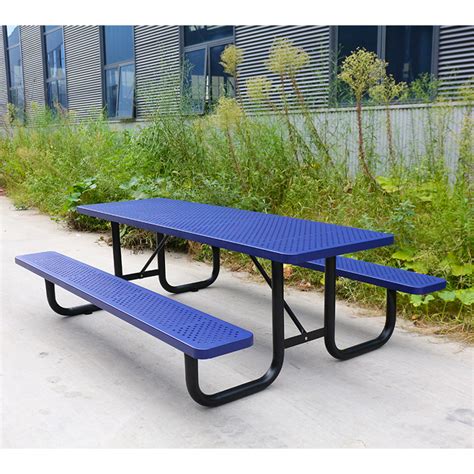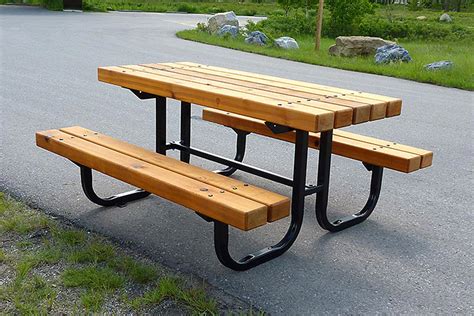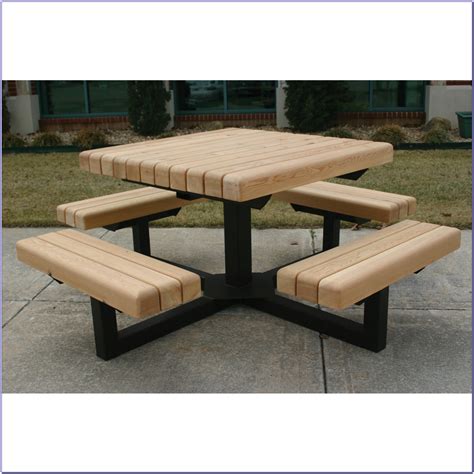When it comes to outdoor gatherings, whether in a park, at a corporate event, or in a backyard, commercial picnic tables are an essential component. These tables are designed to withstand the elements and heavy use, making them a crucial investment for businesses, municipalities, and individuals alike. With a wide range of materials, sizes, and styles available, selecting the right commercial picnic table can be a daunting task. In this article, we will delve into the world of commercial picnic tables, exploring their benefits, types, and features to help you make an informed decision.
Key Points
- Commercial picnic tables are designed for heavy use and outdoor conditions, making them ideal for parks, events, and businesses.
- Tables come in a variety of materials, including wood, metal, recycled plastic, and concrete, each with its own set of benefits and drawbacks.
- Size and style options range from traditional rectangular tables to more modern, curved designs, accommodating different spaces and user needs.
- Accessibility features, such as wheelchair-accessible tables and adaptive seating, are crucial for inclusive outdoor spaces.
- Regular maintenance and upkeep are essential to extend the lifespan of commercial picnic tables and ensure user safety.
Benefits of Commercial Picnic Tables

Commercial picnic tables offer numerous benefits, including durability, low maintenance, and versatility. Unlike residential picnic tables, commercial tables are built to withstand harsh weather conditions, heavy use, and potential vandalism. They are ideal for parks, restaurants, and event spaces, where they can be used by large numbers of people. Furthermore, commercial picnic tables can be customized to fit specific needs, such as adding umbrellas, benches, or adaptive seating for people with disabilities.
Types of Commercial Picnic Tables
Commercial picnic tables come in a variety of materials, each with its own set of advantages and disadvantages. Wooden tables are a popular choice for their natural aesthetic and durability. However, they require regular maintenance to prevent rot and insect damage. Metal tables, on the other hand, are resistant to weathering and vandalism but can be noisy and hot in direct sunlight. Recycled plastic tables are an eco-friendly option, made from recycled materials and resistant to rot, insects, and weathering. Concrete tables are highly durable and low maintenance but can be heavy and expensive to install.
| Material | Benefits | Drawbacks |
|---|---|---|
| Wood | Natural aesthetic, durable | Requires maintenance, prone to rot and insect damage |
| Metal | Resistant to weathering and vandalism, durable | Noisy, hot in direct sunlight |
| Recycled Plastic | Eco-friendly, resistant to rot and weathering | May not be as durable as other materials |
| Concrete | Highly durable, low maintenance | Heavy, expensive to install |

Accessibility Features

Accessibility is a critical consideration when it comes to commercial picnic tables. Wheelchair-accessible tables with adaptive seating and transfer stations can provide equal access to outdoor spaces for people with disabilities. Additionally, accessible table heights and clearance spaces can ensure that users with mobility impairments can comfortably use the tables. When selecting a commercial picnic table, look for models that meet or exceed accessibility standards, such as the Americans with Disabilities Act (ADA) guidelines.
Maintenance and Upkeep
Regular maintenance and upkeep are essential to extend the lifespan of commercial picnic tables and ensure user safety. Cleaning the tables regularly can prevent the buildup of dirt, grime, and bacteria. Inspecting the tables for damage or wear can help identify potential issues before they become major problems. Repairing or replacing damaged components can prevent further damage and ensure user safety. By prioritizing maintenance and upkeep, you can help ensure that your commercial picnic tables remain safe, functional, and attractive for years to come.
What is the most durable material for commercial picnic tables?
+Recycled plastic and concrete are highly durable materials for commercial picnic tables, resistant to weathering, rot, and insect damage. However, the most durable material will depend on the specific needs and conditions of your space.
How often should I clean my commercial picnic tables?
+Clean your commercial picnic tables regularly, ideally after each use, to prevent the buildup of dirt, grime, and bacteria. Additionally, inspect the tables for damage or wear and perform maintenance tasks as needed.
What are the ADA guidelines for commercial picnic tables?
+The Americans with Disabilities Act (ADA) guidelines for commercial picnic tables include requirements for wheelchair-accessible tables, adaptive seating, and transfer stations. Look for tables that meet or exceed these standards to ensure equal access to outdoor spaces for people with disabilities.
In conclusion, commercial picnic tables are a vital component of outdoor gatherings, providing a durable, low-maintenance, and versatile space for people to come together. By considering the benefits, types, and features of commercial picnic tables, you can make an informed decision that meets the specific needs of your space and users. Remember to prioritize accessibility, maintenance, and upkeep to ensure that your tables remain safe, functional, and attractive for years to come.
